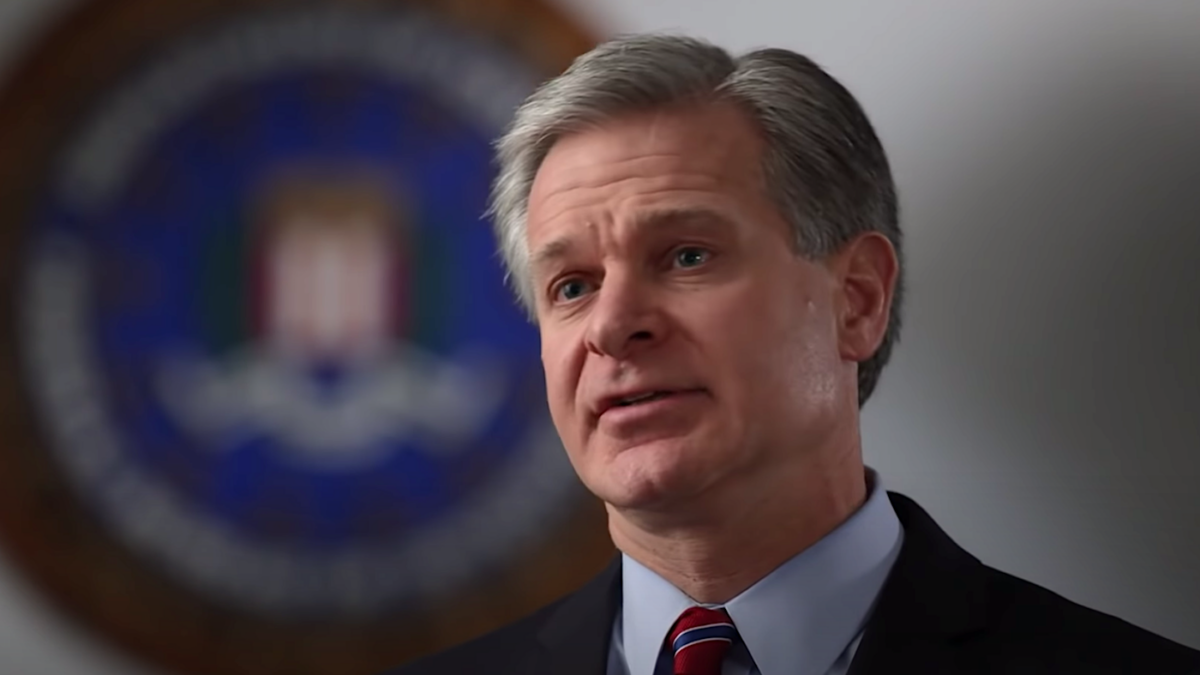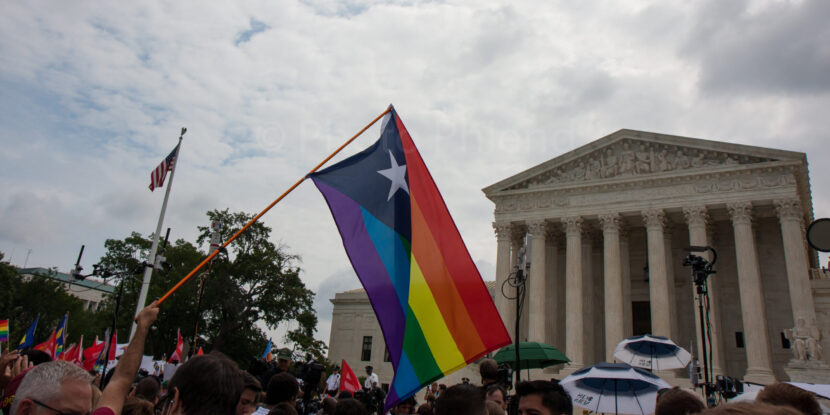
FBI Director Christopher Wray sat for nearly four hours of questioning on Wednesday before the House Judiciary Committee. Here are the top takeaways from the hearing.
1. Wray Indicates Foreign Intel Agencies Worked with Big Tech to Silence Speech
The FBI director faced fierce questioning from Republican committee members on the FBI’s efforts to induce Big Tech to censor American speech. Several representatives specifically challenged Wray to justify the FBI passing along requests from the Ukrainian intelligence agency, SBU, to social media companies. The FBI’s role as a conduit for SBU was just revealed on Monday in a report from the House Select Subcommittee on the Weaponization of the Federal Government.
That report revealed that following Russia’s invasion of Ukraine, the SBU enlisted the FBI to forward to American social media companies lists of accounts that allegedly “spread Russian disinformation.” The FBI obliged, sending a flurry of requests for accounts to be removed, including many American accounts, to multiple social media platforms. In fact, the House report highlighted the inclusion of the official, verified, Russian-language account of the U.S. State Department. The House Judiciary Committee queried Wray on how this could happen, while also inquiring why the FBI would assist the SBU in this endeavor, especially in light of Russia’s known infiltration of SBU.
In explaining the FBI’s involvement, Wray stressed that Russia’s invasion of Ukraine in February 2022 had cut off Ukraine’s communications, causing SBU to ask the FBI to contact U.S. companies on their behalf with the list of accounts supposedly spreading Russian disinformation. But as Republicans on the committee highlighted, the account lists in question included American accounts. Thus, the FBI’s involvement triggered the same First Amendment problems as those litigated in Missouri v. Biden.
This testimony also raised a second area of concern, namely the apparent coordination between U.S. social media companies and foreign governments. Wray said he served as an intermediary because Ukraine’s communications system was down. But in that case, it appears SBU would have contacted the American companies on its own behalf, seeking the silencing of Americans’ speech.
So the question for American social media companies is this: Do they accept requests to remove accounts or posts from foreign countries? And do they censor Americans’ speech based on foreign claims of disinformation?
2. Private Corporations Present a Bigger Concern Than Wray
Social media companies are not the only ones who have some explaining to do following Wray’s testimony. Americans should also demand answers from private businesses with access to consumer information, especially those in the financial sector.
This concern flows from Wray’s response to questioning about Bank of America handing the FBI financial records of customers who had purchased firearms within the six months before the Jan. 6, 2021, Capitol riot. Wray defended the FBI’s receipt of this information by noting that “a number of business community partners, all the time, including financial institutions, share information with us about possible criminal activity.” Such activity is entirely lawful, the FBI director maintained, although he added that the FBI opted not to use the Bank of America data to avoid concerns over the bureau obtaining that data.
That the FBI decided not to use the data, however, provides no comfort because Bank of America obviously had no qualms about sharing the information. Further, Wray framed Bank of America’s data sharing as consistent with “business partners” who “all the time” share information about possible criminal activity.
But financial data showing a customer had previously purchased a gun does not represent evidence of “possible criminal activity.” Yet that didn’t stop Bank of America from giving the information to the FBI. So what other financial information is Bank of America providing? And what about other “business partners”?
3. Wray Needs to Read the Court’s Opinion in Missouri v. Biden
The partnership that took main billing during Wednesday’s hearing was that forged between the FBI and social media companies, and Republicans drilled Wray on the coordinated efforts to censor American speech. Throughout the entire hearing, though, Wray unwaveringly maintained the bureau was not responsible for the censorship because the FBI was merely making suggestions that posts involving foreign malign influence be removed.
No one who read the district court’s opinion in Missouri v. Biden could reasonably reach that conclusion. And since the FBI played such a heavy role in the censorship enterprise summarized in that case, the FBI director owes it to the public to actually study that opinion.
DOJ lawyers may be telling Wray the FBI is in the clear, but a federal judge disagreed, and since the court has ordered the FBI to abandon its unconstitutional conduct, Wray needs to understand precisely what that means. Reading the court’s unfiltered opinion is the only way to see the many ways the FBI violated the First Amendment.
4. So Much Ignorance, So Little Time
Wray was not only ignorant of the facts underlying Missouri v. Biden, but he also revealed several other blind spots. For instance, during the hearing, Wray acknowledged he had previously testified that the FBI had not used Section 702 of the Foreign Intelligence Surveillance Act, which allows the federal government to collect communications of foreign individuals, in its investigation of the Jan. 6 Capitol riot. That ended up not being accurate, however, but Wray was “blissfully ignorant” of that fact when he testified to the contrary to Congress.
Democrat Rep. Eric Swalwell also put on a display of ignorance Wednesday, although in his case it was a feigned ignorance, with the California congressman framing the Hunter Biden laptop as concerning the nudes of a private citizen. While Swalwell may still be fixated on the nudes on the laptop, Republicans’ concern has always been of the evidence of a pay-to-play scandal implicating now-President Biden.
Then there’s Rep. Zoe Lofgren who claimed the GOP majority was engaging in “conspiracy theories” to discredit “one of the premier law enforcement agencies in the United States,” and “without any evidence” trying to “make the case that the FBI is somehow opposed to conservative views.” These 20 examples tell a different story.
5. Why Was Auten Anywhere Near Biden Evidence?
Wray and the Democrats weren’t the only ignorant ones, however. Republicans were clueless when it came to understanding why FBI analyst Brian Auten was anywhere near evidence implicating Hunter Biden.
After all, Auten had been under internal investigation since 2019 for his role in Crossfire Hurricane. Given the partisan witch hunt that investigation proved to be, why would the bureau allow Auten to play a part in the highly political investigation of Hunter Biden?
Yet it apparently did. A whistleblower has told Sen. Chuck Grassley, R-Iowa, that Auten opened an assessment in August 2020 and that assessment provided other FBI agents the ability to falsely brand derogatory information about Hunter Biden as disinformation.
Wednesday’s testimony by the FBI director shed no light on the question of Auten’s involvement.
6. AG Garland’s the Real Hack Targeting Parents
While Wray was unable to explain Auten’s involvement in the Hunter Biden investigation, he made clear that when it came to the parents-are-terrorists memorandum, that was all Attorney General Merrick Garland’s doing. That testimony proved enlightening by showing that for all of the FBI’s deficiencies, even its director sees the attorney general as more of a hack for targeting parents at school board meetings.
7. Orange Man Bad, FBI Good
Also enlightening were the Democrats’ main lines of questioning. Here, there were two. The leftist lawmakers spent most of their time rehabilitating the FBI, reciting the many important bureau missions, showcasing hero agents, highlighting horrible attacks on FBI offices, and rejoicing in the FBI’s family days. Then the far-left faction merely attacked Donald Trump and MAGA Republicans.
Together these lines of questioning exposed the Democrats as unconcerned by the many abuses Americans have witnessed over the last half-dozen years. And what was unserious appeared downright absurd when Democrat Pramila Jayapal used her allotted time to challenge the FBI director over the bureau’s purchase of citizens’ data, including location data, from various data brokers. Pre-Trump, every Democrat would have been drilling Wray on such abuses of civil liberties, but this week it was only Jayapal.
8. The Speech or Debate Clause Does Some Heavy Lifting
In addition to the Democrats’ two main lines of questioning, a sub-theme of many of the comments concerned the whistleblowers, with Democrats attempting to discredit their testimony. One way they sought to do that was by presenting the whistleblowers as hired tongues. But beginning with Rep. Jerry Nadler, D-N.Y., and continuing through Rep. Sheila Jackson Lee, D-Texas, they made this point by slandering the whistleblowers, falsely stating they had been paid for their testimony.
Of course, the speech or debate clause prevents the whistleblowers from suing the committee members who lied about them, which is precisely why they had no qualms about doing so.
9. Schiff Can’t Stop Lying
Rep. Adam Schiff, D-Calif., is proof of this point because he can’t stop lying. He lied about the Carter Page FISA warrants. And on Wednesday, he lied again about President Donald Trump’s telephone call with the Georgia secretary of state following the November 2020 election.
Unfortunately, “as I’ve been forced to detail time and again because the corrupt media continue to lie about the conversation, the transcript of the call established that Trump did not request that Raffensperger ‘find 11,780 votes.’” As I wrote in February, “It never happened.” Instead, during that “telephone conversation between Trump’s legal team and the secretary of state’s office, Trump’s lawyer explained to Raffensperger that ‘the court is not acting on our petition. They haven’t even assigned a judge.’” Thus the legal team wanted the secretary of state’s office to investigate the violations of Georgia election law because the court refused to do its duty.
Schiff knows this, but he also knows there are no consequences for lying. On the contrary, he might just convince Californians to send him to the Senate so he can follow in Harry “He Didn’t Win, Did He?” Reid’s footsteps.
10. A Mixed Bag on the Pro-Life Question
The final takeaway topic from Wray’s testimony concerned the pro-life question, and Wray presented a mixed bag. On the one hand, he outrageously refused to condemn the FBI agents who decided to use a SWAT-like display of force to arrest a pro-life sidewalk counselor at his family home when the man’s attorney had agreed to arrange for his client to voluntarily appear to face the charges — of which he was later acquitted.
On the other hand, when Rep. Deborah Ross, D-N.C., attempted to frame abortionists and abortion facilities as being increasingly targeted in the wake of Dobbs, Wray corrected the narrative, noting that the uptick in violence has been to pro-life centers, with 70 percent of the cases involving such organizations.
https://thefederalist.com/2023/07/13/top-10-takeaways-from-fbi-director-christopher-wrays-house-judiciary-testimony/
